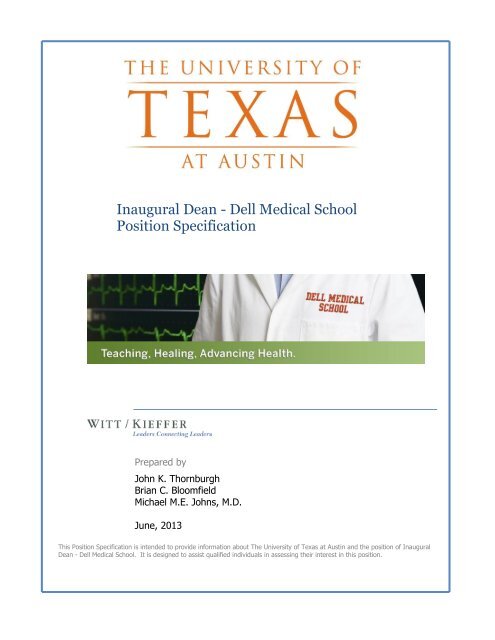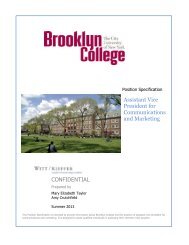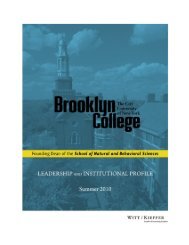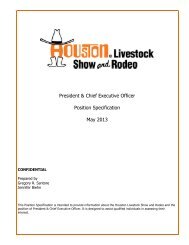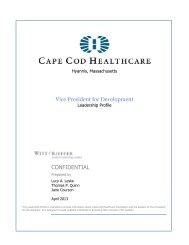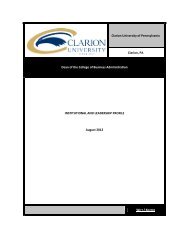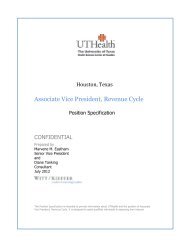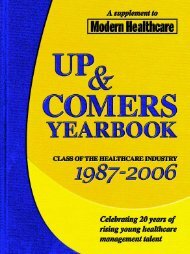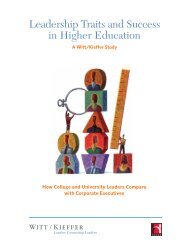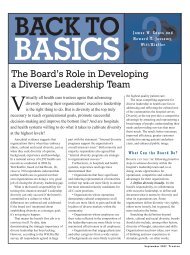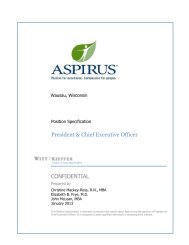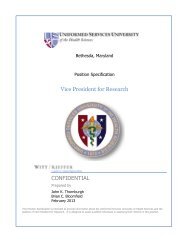to View Detailed Job Description - Witt/Kieffer
to View Detailed Job Description - Witt/Kieffer
to View Detailed Job Description - Witt/Kieffer
Create successful ePaper yourself
Turn your PDF publications into a flip-book with our unique Google optimized e-Paper software.
Inaugural Dean - Dell Medical School<br />
Position Specification<br />
Prepared by<br />
John K. Thornburgh<br />
Brian C. Bloomfield<br />
Michael M.E. Johns, M.D.<br />
June, 2013<br />
This Position Specification is intended <strong>to</strong> provide information about The University of Texas at Austin and the position of Inaugural<br />
Dean - Dell Medical School. It is designed <strong>to</strong> assist qualified individuals in assessing their interest in this position.
The Opportunity<br />
The Dell Medical School of The University of Texas at Austin (“Dell Medical School”) is seeking<br />
an exceptional leader <strong>to</strong> serve as its Inaugural Dean and quickly build this new enterprise in<strong>to</strong> a<br />
world-renowned center for teaching, research, and clinical care.<br />
Scheduled <strong>to</strong> accept its first class of 50 students in 2016, the new school intends <strong>to</strong> offer a<br />
unique opportunity in medical education. As part of the campus of one of the nation’s leading<br />
research universities, it will pursue excellence in healthcare research and in transdisciplinary<br />
and interprofessional education. The Dell Medical School will be the fifth medical school in the<br />
UT System and the first medical school established in nearly five decades by a member of the<br />
Association of American Universities, an organization of leading public and private research<br />
universities.<br />
As part of a visionary partnership with Se<strong>to</strong>n Healthcare Family, a regional health care system,<br />
and Central Health, a public health care district, a new teaching hospital will be constructed<br />
adjacent <strong>to</strong> the new Dell Medical School. By designing these facilities concurrently within an<br />
integrated complex, the effort represents an unprecedented opportunity <strong>to</strong> create the best<br />
possible environment <strong>to</strong> respond <strong>to</strong> community needs and provide patient care.<br />
An extraordinary commitment of resources has already been made <strong>to</strong> enable the development<br />
and success of the Dell Medical School. Se<strong>to</strong>n Healthcare expects <strong>to</strong> invest $250 million <strong>to</strong>wards<br />
the establishment of the teaching hospital. Central Health will leverage a recent publicly<br />
approved real estate levy with federal matching funds <strong>to</strong> provide $35 million in annual revenues<br />
<strong>to</strong> the project. The University of Texas System Board of Regents has pledged at least $25<br />
million annually plus an additional $5 million per year for eight years, for faculty recruitment<br />
and support. Finally, the Michael & Susan Dell Foundation recently announced a $50 million gift<br />
<strong>to</strong> the school.<br />
The Inaugural Dean will build collaborative relationships and innovative programs; recruit an<br />
outstanding faculty and staff; organize and direct the process leading <strong>to</strong> accreditation of the<br />
new school; oversee the completion of the new medical school facilities; and expand and build<br />
upon the partnerships in this uniquely pivotal venture. This Dean will have an unparalleled<br />
opportunity <strong>to</strong> lead the programmatic and physical construction of a new medical school that<br />
deploys state-of-the art facilities for basic and translational research, advanced technologies<br />
and the most advanced teaching and learning methods for a contemporary curriculum. The<br />
Dean will provide vision and leadership in advanced patient treatment and novel medical<br />
technologies. The Dean will show understanding of the global needs in health care. In addition,<br />
the Dean will have a unique opportunity <strong>to</strong> establish a strong entrepreneurial and innovationculture<br />
in one of the most economically dynamic regions of the country.<br />
The successful Inaugural Dean candidate will possess a medical degree from an accredited<br />
medical school and a substantial record of leadership and achievement in academic medicine,<br />
medical education, and medical research. The Dean must demonstrate the ability <strong>to</strong> effectively<br />
steward medical school resources; understand, appreciate and wisely guide the development of<br />
the medical education and research programs; effectively support the distinct academic and<br />
clinical partnerships; be able <strong>to</strong> represent the medical school in the various regional and<br />
2
national communities; and successfully raise funds from a variety of sources including private<br />
philanthropy.<br />
Because the role of the Dean is new, complex and demanding, the successful candidate’s<br />
experience must include progressively more responsible administrative experience in<br />
environments that rely upon vision, teamwork, planning, delegation of authority and measures<br />
of accountability. Above all, the Dean should present a scientific vision, and an entrepreneurial<br />
style and a track record of success in establishing new enterprises and leading through times of<br />
change.<br />
This role presents the right leader with the opportunity <strong>to</strong> forge an his<strong>to</strong>ric cooperation among<br />
teachers, researchers and health care providers in state-of-the-art facilities, in a common effort<br />
<strong>to</strong> produce the knowledge, management systems and skilled doc<strong>to</strong>rs who will improve the lives<br />
of millions of people, both locally and globally.<br />
The University of Texas at Austin<br />
The University of Texas at Austin is one of the<br />
largest public universities in the United States and is<br />
the largest institution of The University of Texas<br />
System.<br />
Founded in 1883, the university has grown from a<br />
single building, eight teachers, two departments<br />
and 221 students <strong>to</strong> a 350-acre main campus with<br />
17 colleges and schools, about 24,000 faculty and<br />
staff, and more than 50,000 students.<br />
The university’s reach goes far beyond the borders of the main campus with satellite campuses<br />
and research centers across Texas, including the J.J. Pickle Research Campus, the Marine<br />
Science Institute, the McDonald Observa<strong>to</strong>ry, the Mon<strong>to</strong>polis Research Center and the<br />
Brackenridge tract.<br />
With an enrollment of 11,000 students and more than 3,500 master’s and doc<strong>to</strong>r’s degrees<br />
awarded annually, the Graduate School is a national leader in graduate degrees awarded and<br />
one of the largest graduate schools in the nation. More than 8,700 bachelor’s degrees are<br />
awarded annually in more than 170 fields of study and 100 majors.<br />
The university has one of the most diverse student populations in the country and is a national<br />
leader in the number of undergraduate degrees awarded <strong>to</strong> minority students.<br />
3
The Dell Medical School: An Overview<br />
Mission, Vision and Values<br />
Mission<br />
The University of Texas at Austin Dell Medical School is committed <strong>to</strong> improving human health<br />
through excellence in interprofessional and transdisciplinary education, research, health care,<br />
and community involvement.<br />
Vision<br />
The School will:<br />
Core Values<br />
Transform current and future medicine and the health care delivery system through<br />
discovery, innovation, application, and translation.<br />
Educate and inspire the next generation of physician leaders by providing the foundation<br />
for our students <strong>to</strong> become skillful, ethical, and compassionate physicians; inquisitive<br />
scientists who are committed <strong>to</strong> the scholarship of discovery; and dynamic and<br />
successful medical educa<strong>to</strong>rs.<br />
Prepare clinicians <strong>to</strong> provide person-centered, high-quality, safe and cost-effective care<br />
that leads <strong>to</strong> optimal outcomes for the communities we serve.<br />
Advance boundaries of medicine by being a vanguard of research and by creating an<br />
environment of scholarship, intellectual curiosity and exchange.<br />
Foster interprofessional team development <strong>to</strong> enhance patient safety and improve health<br />
care outcomes.<br />
Leverage clinical and research capabilities through collaboration with community<br />
healthcare providers and biotech businesses.<br />
The school will accomplish its Mission and Vision by modeling:<br />
Adaptability – maintain flexibility and resilience in order <strong>to</strong> respond <strong>to</strong> changing needs<br />
and expectations of individuals and the community.<br />
Collaboration – work <strong>to</strong>gether and align interprofessional teams <strong>to</strong> fulfill our mission<br />
regardless of organizational boundaries.<br />
Compassion - relate <strong>to</strong> others in a caring, empathic manner and strive <strong>to</strong> prevent and<br />
relieve suffering.<br />
Discovery – motivate <strong>to</strong>wards the cutting edge of what is unknown by empowering our<br />
faculty and students <strong>to</strong> remain intellectually curious and inquisitive.<br />
Diversity – create, foster, and maintain a culturally diverse learning community.<br />
4
Excellence -- achieve our highest goals and become the best we can be.<br />
Integrity – maintain the highest respect, trust and ethical standards in all our<br />
interactions and activities.<br />
Leadership – educate and train physicians, researchers, and other health care<br />
professionals <strong>to</strong> become leaders in their fields at a regional, state and national level.<br />
Learning – develop strategies for life-long, self-directed learning, sharing of knowledge,<br />
and translating new concepts <strong>to</strong> practice.<br />
Responsibility - exhibit a strong sense of duty, stewardship and accountability <strong>to</strong> each<br />
other and <strong>to</strong> our varied constituencies.<br />
Partners and Resources<br />
The Dell Medical School is supported by an extraordinary group of partner organizations all<br />
committed <strong>to</strong> the development, growth, and success of a world-class institution. These partners<br />
have invested unprecedented resources and expertise <strong>to</strong>wards the launch of the school:<br />
The University of Texas System operates nine academic UT campuses and six health<br />
science centers. The Board of Regents has approved the creation<br />
of the Dell Medical School, clearing the way for a decision by the<br />
Higher Education Coordinating Board on whether The University of<br />
Texas at Austin may offer an MD degree. The Board of Regents<br />
has pledged funds for the construction of the Dell Medical School -<br />
- at least $25 million in continuing support and an additional $5<br />
million annually for eight years -- for faculty recruitment and<br />
support.<br />
Construction of a new University Medical Center Brackenridge is the<br />
job of Se<strong>to</strong>n Healthcare Family. It will be a teaching hospital for<br />
Dell Medical School students, while also providing residencies <strong>to</strong><br />
graduate and postgraduate medical education. Se<strong>to</strong>n expects <strong>to</strong><br />
commit $250 million <strong>to</strong> the hospital.<br />
Se<strong>to</strong>n operates more than 90 clinical locations including five major<br />
medical centers, two community hospitals, three rural hospitals, an inpatient mental health<br />
hospital, three primary care clinics for uninsured people and several strategically located health<br />
facilities. The system offers the region’s only Level I trauma centers for adult and pediatric<br />
patients. Its insurance division works with commercial insurance companies, community<br />
physicians and Medicaid and Medical Access programs for low-income persons, <strong>to</strong> assist in the<br />
management of the region’s overall health.<br />
Se<strong>to</strong>n is home <strong>to</strong> The University of Texas Southwestern (UTSW) Medical Center’s Austin medical<br />
residency programs, as well as the Se<strong>to</strong>n/UTSW Clinical Research Institute.<br />
The organization’s role in education, research and spiritual programming furthers Se<strong>to</strong>n’s<br />
mission <strong>to</strong> improve the health of the communities it serves, with special concern for the poor<br />
5
and the vulnerable, as it prepares the region’s next generation of clinicians. In Fiscal Year 2011,<br />
Se<strong>to</strong>n provided almost $350 million in charity care.<br />
Se<strong>to</strong>n is a member of Ascension Health, the nation’s largest not-for-profit health network.<br />
Created by Travis County voters in 2004, Central Health (the<br />
Travis County Healthcare District) provides health care coverage<br />
and funding through an extensive network of health care<br />
providers who offer access <strong>to</strong> care <strong>to</strong> low-income, uninsured<br />
residents of Travis County. Central Health is primarily funded by<br />
property tax revenues and lease payments from Se<strong>to</strong>n<br />
Healthcare Family for University Medical Center Brackenridge<br />
(UMCB), which Central Health owns. Se<strong>to</strong>n leases the hospital from Central Health and operates<br />
it on Central Health's behalf. Central Health and Se<strong>to</strong>n also are partners in creating a new<br />
organization called the Community Care Collaborative. The Collaborative is designed <strong>to</strong><br />
transform the delivery system <strong>to</strong> better coordinate services and funding for the benefit of those<br />
who most need access <strong>to</strong> health care in Travis County.<br />
Central Health will leverage -- at a rate more than double -- the local investment in health care<br />
delivery with matching federal funds. As part of this plan, Central Health will purchase services<br />
from the Dell Medical School for the population it serves, resulting in $35 million in annual<br />
revenue <strong>to</strong> the medical school project. Travis County voters in November 2012 approved an<br />
increase in local property taxes from 7.89 cents per $100 valuation <strong>to</strong> 12.89 cents per $100<br />
valuation, which will be used <strong>to</strong> support numerous innovative healthcare initiatives, including<br />
the Collaborative, Dell Medical School, the new teaching hospital and others.<br />
On Jan. 30, 2013 the Michael & Susan<br />
Dell Foundation announced a new $50<br />
million commitment <strong>to</strong> establish the Dell<br />
Medical School at The University of Texas<br />
at Austin. Additionally, the Dell family<br />
foundation committed another $10<br />
million <strong>to</strong> Austin and Travis County community health quality and access programs over the<br />
next 10 years. Since its inception in 1999, the foundation has invested nearly $1 billion in health<br />
and education programs around the globe, including $150 million during the past decade <strong>to</strong><br />
promote family and childhood health in Central Texas.<br />
Academic Philosophy<br />
Students and faculty will be provided with the opportunity <strong>to</strong> conduct in-depth research in basic<br />
and translational sciences and medicine. They will test theories in the natural sciences,<br />
engineering and technology, business management and social sciences in clinics and state-ofthe-art<br />
labora<strong>to</strong>ries. The Dell Medical School will create opportunities for synergy among UT’s<br />
existing schools and colleges of nursing, social work, pharmacy, natural sciences, engineering,<br />
education, liberal arts, public policy, and business. It will leverage research in areas as diverse<br />
as medical ethics and business systems <strong>to</strong> solve one of the most pressing issues facing<br />
America: how <strong>to</strong> create better health in the communities we serve.<br />
6
From research bench <strong>to</strong> the patient clinic <strong>to</strong> bedside, it will be a fertile, inspirational academic<br />
environment for the intellectually curious student and for faculty members dedicated <strong>to</strong><br />
discovery. This approach — interprofessional and transdisciplinary education — will train doc<strong>to</strong>rs<br />
who will pursue medicine with broad scientific and academic backgrounds, who love innovation<br />
and respect the contributions of all health care providers.<br />
Research<br />
The Dell Medical School will draw on the university’s existing research strengths, including cell<br />
and molecular biology, neuroscience, biomedical engineering, chemistry, public health,<br />
sociology, psychology, health care delivery systems and health care policy. The school will also<br />
be integrated with the university’s well-regarded programs in nursing, pharmacy and social<br />
work <strong>to</strong> prepare physicians for the health care system of the future and work collaboratively<br />
with a growing biotechnology industry in Central Texas. The result will be innovations that<br />
improve the way people receive health care. The research portfolio will balance basic, clinical<br />
and community research.<br />
Facilities<br />
An education/administration building and a research building are planned and will be funded<br />
through the UT System Board of Regents. The buildings will be located near the current site of<br />
University Medical Center Brackenridge and the university's School of Nursing. On May 9, the<br />
University of Texas Board of Regents approved a $334 million request for these facilities.<br />
county area.<br />
Se<strong>to</strong>n has committed at least $250 million – a<br />
portion of which will come from fundraising ---<br />
<strong>to</strong> build a new teaching hospital <strong>to</strong> replace the<br />
aging University Medical Center Brackenridge.<br />
The hospital will serve as the medical school’s<br />
primary clinical in-patient teaching facility and<br />
enhance services <strong>to</strong> residents of Central Texas.<br />
It will also upgrade the only Level I adult<br />
trauma center for a populous and growing 11-<br />
A team that includes the UT System, The University of Texas at Austin, Se<strong>to</strong>n Healthcare Family<br />
and Central Health has been developing a master site plan for the placement of the school, the<br />
new teaching hospital, clinics and a medical office building. The area being studied is beyond<br />
the southeast corner of the university's campus, generally south of Martin Luther King Jr.<br />
Boulevard, west of Interstate 35 and east of Trinity Street, including the current site of<br />
University Medical Center at Brackenridge. The goal of the effort is <strong>to</strong> accommodate current<br />
needs while allowing for growth. The master plan also is being coordinated with the State of<br />
Texas, which is working on a master plan for state property in the adjacent Capi<strong>to</strong>l area. Among<br />
the many planning dimensions are transportation, utilities, flooding and environmental concerns<br />
and general urban design.<br />
7
Governance<br />
To guide the early stages of building the Dell Medical School, a steering committee has been<br />
established, led by Dr. Sue Cox, interim senior associate dean, and Dr. Robert O. Messing, vice<br />
provost for biomedical sciences. The committee represents schools and colleges within The<br />
University of Texas at Austin as well as Se<strong>to</strong>n Healthcare Family, Central Health and UT<br />
Southwestern Medical School. Its advisers include representatives of the University of Texas<br />
System and key UT Austin administra<strong>to</strong>rs.<br />
Upon appointment, the Inaugural Dean will report directly <strong>to</strong> the Provost of The University of<br />
Texas at Austin but will also hold the title of Vice President, and as such will be considered part<br />
of the President’s senior leadership team.<br />
Accreditation<br />
Earlier this year, the University of Texas System Regents gave preliminary approval <strong>to</strong> ask the<br />
Texas Higher Education Coordinating Board <strong>to</strong> authorize a Doc<strong>to</strong>r of Medicine degree at the<br />
new medical school. The Dell Medical School must be accredited by the Liaison Committee on<br />
Medical Education (LCME) <strong>to</strong> be eligible for many federal grants, and students must study at an<br />
accredited school <strong>to</strong> qualify <strong>to</strong> take the U.S. Medical Licensing Examination. The LCME also<br />
requires that the sponsoring institution receive regional accreditation from the appropriate<br />
body. For Texas, that is the Southern Association of Colleges and Schools Commission on<br />
Colleges (SACS COC), and UT Austin is accredited as a Level VI school, offering 4 or more<br />
Doc<strong>to</strong>ral Degrees.<br />
Work is currently underway by the Steering Committee <strong>to</strong> prepare an outline that identifies the<br />
curriculum that the Dell Medical School will teach, and the target date <strong>to</strong> produce this in draft<br />
form is September 1, 2014. The target date <strong>to</strong> submit the LCME application is December, 2014<br />
with the hope for preliminary accreditation in June, 2015.<br />
The Role of the Dean of the Dell Medical School<br />
The Inaugural Dean of the Dell Medical School (“the Dean”) is the chief architect, executive and<br />
intellectual leader of the school. The Dean is responsible for building and ensuring the highest<br />
possible quality in medical, graduate, and post-graduate education and research. In addition,<br />
the Dean will be a key player in sustaining partnerships established with Se<strong>to</strong>n Healthcare and<br />
Central Health that will assure the success of the new Dell Medical School and the growth of<br />
healthcare in the Austin region. The Dean is also responsible for matters relating <strong>to</strong> the design<br />
and effective administration of the Dell Medical School including academic programs, faculty,<br />
students, staff, facilities, resources, budgets, fundraising and relationships with the community<br />
and external stakeholders.<br />
8
Opportunities and Expectations for Leadership<br />
The key stakeholders leading the development and launch of the Dell Medical School have<br />
identified the following general goals and objectives:<br />
Build and lead an organization that will develop a strong reputation for excellence in<br />
education, for advancement in research and scholarly activities, for promotion of quality<br />
clinical training and service, and for a demonstrated commitment <strong>to</strong> community-based<br />
medical care.<br />
Recruit a first-class senior leadership team <strong>to</strong> whom the Dean can effectively delegate the<br />
key strategic and operational aspects of establishing a medical school.<br />
Build relationships and partnerships with Austin’s leaders and serve as the “champion” who<br />
will inspire the community’s enthusiasm and support for the Dell Medical School.<br />
In partnership with the academic leaders of The University of Texas at Austin, build a<br />
progressive, cutting edge curriculum that challenges and inspires students, and integrates<br />
many of the university’s outstanding colleges, schools, centers, and programs in robust<br />
interdisciplinary initiatives.<br />
Build a culture of excellence in the Dell Medical School that incorporates fairness, integrity,<br />
respect, creativity, initiative and community service.<br />
Catalyze development of an innovation economy centered around biotechnology in Austin<br />
and Central Texas.<br />
The following are specific leadership priorities that the Inaugural Dean will want <strong>to</strong> pay<br />
particular attention <strong>to</strong> in the earlier stages of his/her leadership tenure:<br />
1. Achieving successful accreditation – Even with ample resources and partners in place,<br />
a new medical school cannot open without gaining LCME accreditation through a peerreview<br />
process designed <strong>to</strong> attest <strong>to</strong> the educational quality of new programs. The incoming<br />
Dean must immediately insure that accreditation plans are properly structured and on an<br />
appropriate time track for review and approval so that the first class can be recruited in the<br />
Fall of 2015.<br />
2. Defining clinical education partnerships – The Se<strong>to</strong>n Healthcare Family has sponsored<br />
extensive medical residency programs for years and has drawn on the engagement of many<br />
of the Travis County Medical Society’s 3,200 physicians. Currently, Se<strong>to</strong>n funds over 230 UT<br />
Southwestern residents in 16 residency and fellowship programs, 144 full-time faculty<br />
members, and 180 volunteer faculty members. In addition there are a <strong>to</strong>tal of 100 3 rd and<br />
4 th year UTMB students on clinical rotations in Austin. Residents rotate at other clinical sites<br />
including community clinics, private doc<strong>to</strong>r’s office, and within St. David’s Healthcare<br />
Partnership (Austin’s second largest system). The Dean will need <strong>to</strong> fully appreciate the<br />
newly-defined roles, relationships and operating/financial arrangements of these partners.<br />
9
3. Building robust interdisciplinary opportunities – The establishment of a new medical<br />
school within a world-class teaching and research university presents an enormous potential<br />
for developing powerful interdisciplinary and interprofessional programs that will extend the<br />
value of the medical school <strong>to</strong> all corners of the university. Appendix B offers a starting view<br />
of the many opportunities for collaboration. The Inaugural Dean should focus on learning<br />
about these different schools and their programs and building relationships with their<br />
leaders with an eye <strong>to</strong> quickly leveraging their collective strengths with the medical school.<br />
4. Finalize working agreements with key partners – The agreements in principle that<br />
were developed prior <strong>to</strong> the Proposition 1 tax election will be replaced by detailed working<br />
agreements that include Se<strong>to</strong>n Healthcare Family, Central Health (the Travis County health<br />
care district) and the university. These agreements will cover the assets <strong>to</strong> be constructed<br />
for the Dell Medical School effort and ongoing funding of medical school education,<br />
residency training and the provision of medical services. It will be essential that the Dean<br />
not only finalize formal agreements, but through this process ensure that all parties are<br />
aligned <strong>to</strong>wards common goals. This will allow the Dell Medical School <strong>to</strong> serve as a “bridge”<br />
that connects its partners inside and outside of the university.<br />
5. Managing stakeholder expectations – An enormous amount of excitement has been<br />
generated by this initiative, and a great deal of attention is centered on the establishment of<br />
the medical school by constituents in the university, the hospital community, the physician<br />
community, public/political leaders, taxpayers, the business sec<strong>to</strong>r, and the media. While all<br />
are aligned on the primary goal of building a world-class medical school, each constituency<br />
has a keen interest in the value that the medical school will add <strong>to</strong> their particular needs.<br />
For example, while The University of Texas at Austin’s academic leaders are particularly<br />
focused on a school that will excel in teaching and research, the external communities are<br />
expecting their investments <strong>to</strong> yield a significant return in expanded access <strong>to</strong> high quality<br />
clinical care and that the school will serve as an economic development engine for the<br />
Austin region. These are not mutually exclusive aspirations and will be pursued in parallel.<br />
The Inaugural Dean will need <strong>to</strong> first understand and appreciate these expectations, and<br />
then ensure that the school and its programs ideally balance all of these in a way that<br />
continues the support and respect of these many and diverse stakeholders.<br />
Personal Qualifications and Personal Qualities<br />
The Inaugural Dean of the Dell Medical will be a strategic leader who is fully capable of<br />
managing a substantial, complex, evolving organization. Ideally, the Search Committee is<br />
seeking candidates who come from an academic medicine setting (i.e. medical school dean,<br />
associate/assistant dean, or department chair) whose style and leadership characteristics can<br />
be described as progressive, creative and innovative.<br />
More specifically, the ideal candidate will possess or have demonstrated the vast majority of the<br />
following attributes:<br />
10
Education<br />
M.D., M.D./PhD. or equivalent degree is required;<br />
Board Certification in the candidate’s specialty/discipline is required.<br />
Preferred Experience<br />
Significant achievement in clinical, education and research pursuits; a personal record of<br />
accomplishment in collaborative research, a keen appreciation for interdisciplinary<br />
collaboration; and a personal commitment <strong>to</strong> human and population health research;<br />
Progressive and broad administrative leadership experience within an academic institution;<br />
A demonstrated his<strong>to</strong>ry of innovative leadership, and conversant in current efforts <strong>to</strong><br />
transform medical education using innovative curricula, technologies, and teaching/learning<br />
methodologies;<br />
Exceptional recruiting talents – can bring a vast personal network of relationships and<br />
choose talent in a way that extends leadership in<strong>to</strong> the organization;<br />
Management experience in the “business” of medical schools: finances, research,<br />
accreditation, the challenges and operation of the clinical enterprise; strong fiscal skills and<br />
proven experience with budgets and grants management;<br />
Successful development or expansion of an organization or program; an acknowledged<br />
reputation in the building of exemplary clinical and research programs;<br />
Familiarity and understanding of entrepreneurship and technology commercialization in an<br />
academic medical setting;<br />
Appreciation for project management techniques and <strong>to</strong>ols;<br />
Direct experience in serving in a high-profile role external <strong>to</strong> an institution – interacting<br />
regularly and effectively with political, community, private sec<strong>to</strong>r leaders and the media;<br />
Proven track record of cultivating the interest and involvement of both current and potential<br />
donors, resulting in the closing of major and principal gifts.<br />
Preferred Leadership Qualifications and Personal Qualities<br />
Exceptional interpersonal and communication skills; a record of promoting collaboration and<br />
cultivating strong external relationships; and is a consensus and relationship builder “of the<br />
first order;”<br />
Artful and apt negotiation skills – applied <strong>to</strong>wards the goal of forging “win-win”<br />
compromises;<br />
11
Ability <strong>to</strong> communicate an inspiring long-term vision for the future and be an articulate and<br />
engaging spokesperson for the school;<br />
His<strong>to</strong>ry of bringing different organizations and individuals <strong>to</strong>gether <strong>to</strong> address common<br />
goals, a “leader among leaders;”<br />
Ability <strong>to</strong> project a genuine passion for an organization’s mission and objectives;<br />
A collegial, consultative and diplomatic management style that respects and facilitates<br />
interdisciplinary cooperation;<br />
Ability <strong>to</strong> be strong, disciplined, decisive, <strong>to</strong> take calculated risks and <strong>to</strong> build organizations;<br />
Analytical skills and conceptual thinking that identifies opportunities and catalyzes action;<br />
Level of comfort in hands-on engagement in key areas, but with a sense of when and how<br />
<strong>to</strong> effectively delegate <strong>to</strong> others;<br />
Patient and able <strong>to</strong> thrive in a setting of ambiguity and change;<br />
High level of energy, enthusiasm, humor and optimism;<br />
Approachable and compassionate;<br />
Self-confident with political acumen and personal humility;<br />
Unquestioned personal integrity.<br />
Austin, Texas<br />
Austin is nestled among the rolling hills and lakes of Central Texas, the seat of state<br />
government, an educational Mecca with several area universities, home <strong>to</strong> a host of high tech<br />
companies including Dell Computers, Silicon Labs, Freescale, AMD, Samsung and many others<br />
related <strong>to</strong> the computer, semiconduc<strong>to</strong>r and internet industries. Austin is an entertainment<br />
center that includes the best of live music, the arts, and all the fun of the great outdoors.<br />
Austin's weather has attracted many <strong>to</strong> this beautiful part of Texas; the blue skies and many<br />
sunny days are highly valued by its residents. Austin has its own professional symphony, ballet<br />
and opera companies, dozens of theaters, dance companies, vocal ensembles, and orchestras<br />
producing events year-round, as well as art museums, galleries, and beautiful sculpture<br />
gardens. With its many area universities and colleges and its award-winning public and private<br />
schools, Austin is a thriving educationally driven city.<br />
The city’s expanding health care system now rivals that of any major metropolitan area.<br />
Besides a number of major hospitals and one children's hospital, there are numerous outpatient<br />
clinics, emergency medical facilities, and all manner of awareness programs.<br />
12
For much more information on Austin and its environs, please choose from the many websites<br />
available at http://www.utexas.edu/austin/.<br />
Opportunity Summary<br />
The Inaugural Dean of the Dell Medical School will be presented with the opportunity <strong>to</strong> achieve<br />
the following professional and personal goals:<br />
‣ Serve on the senior leadership team of one of the most respected and renowned research<br />
universities in the United States.<br />
‣ Play a signature role in the development and implementation of a new medical school<br />
whose success will enhance the quality and delivery of health care in all regions of the state<br />
and significantly enhance the medical education of new generations of physicians.<br />
‣ Forge an his<strong>to</strong>ric cooperation among teachers, researchers and health care providers in<br />
state-of-the-art facilities in a common effort <strong>to</strong> produce the knowledge, management<br />
systems and skilled doc<strong>to</strong>rs who will improve the lives of millions of people, both locally and<br />
globally.<br />
‣ Interact regularly with a diverse and collaborative group of senior leaders, including<br />
members of the Board of Regents, campus presidents, peer executives in the UT System<br />
office, and an outstanding staff.<br />
‣ Reside in a region of Texas that is rich with his<strong>to</strong>ry and intellectual tradition and offers a<br />
high quality of living in an affordable setting.<br />
13
Procedure for Candidacy<br />
Inquiries, nominations and applications are invited. Candidates should provide a curriculum<br />
vitae, a letter of application that addresses the responsibilities and requirements described in<br />
the Leadership Statement, and the names and contact information of five references.<br />
References will not be contacted without prior knowledge and approval of candidates. These<br />
materials should be sent electronically via e-mail <strong>to</strong> The University of Texas at Austin<br />
consultants, John K. Thornburgh, Brian Bloomfield and Michael M.E. Johns, M.D., at<br />
DellMedicalDean@wittkieffer.com.<br />
Review of candidates for this position by the Dell Medical School Dean Search Committee will<br />
commence in September, 2013 and will continue until the position is filled, with the hope that<br />
the Inaugural Dean will assume office by early 2014. To make an inquiry please contact John K.<br />
Thornburgh at (412) 209-2666 or johnt@wittkieffer.com or Brian Bloomfield at (949) 797-3548<br />
or brianb@wittkieffer.com. Materials that cannot be transmitted electronically may be sent <strong>to</strong>:<br />
Inaugural Dean, Dell Medical School<br />
The University of Texas at Austin<br />
Attn: John K. Thornburgh<br />
<strong>Witt</strong>/<strong>Kieffer</strong><br />
2015 Spring Road, Suite 510<br />
Oak Brook, IL 60523<br />
The University of Texas at Austin values diversity and is committed <strong>to</strong> equal opportunity for all<br />
persons regardless of age, color, disability, ethnicity, marital status, national origin, race,<br />
religion, sex, sexual orientation, veteran status or any other status protected by law.<br />
Discover Thought Leadership at www.wittkieffer.com<br />
The material presented in this position specification should be relied on for informational purposes only.<br />
This material has been copied, compiled, or quoted in part from The University of Texas at Austin<br />
documents and personal interviews and is believed <strong>to</strong> be reliable. While every effort has been made <strong>to</strong><br />
ensure the accuracy of this information, the original source documents and factual situations govern.<br />
14
Appendix A: Inaugural Dean Search Committee<br />
The members of the search committee are:<br />
Member<br />
Affiliation<br />
Robert O. Messing,<br />
Chair<br />
Vice Provost for Biomedical Sciences<br />
Reginald C. Baptiste Capital Cardiothoracic Surgeons<br />
Charles Barnett<br />
Da’marcus E.<br />
Baymon<br />
Susan Cox<br />
Lynn Crismon<br />
Gregory L. Fenves<br />
Executive Chairman of the Board - Se<strong>to</strong>n Healthcare Family,<br />
Austin, Texas<br />
Senior, UT Austin College of Natural Sciences<br />
UT Southwestern Regional Dean for Austin Programs<br />
Dean, UT Austin College of Pharmacy<br />
Dean, UT Austin Cockrell School of Engineering<br />
J. Gregory Fitz Executive Vice President for Academic Affairs and Provost,<br />
Dean of UT Southwestern Medical School<br />
Francisco González-<br />
Scarano<br />
Andrea Gore<br />
Clarke Heidrick<br />
Linda Hicke<br />
Dan Johns<strong>to</strong>n<br />
Alan Lambowitz<br />
James O. Lindsey<br />
Russell Poldrack<br />
Dean of the School of Medicine and Vice President for Medical<br />
Affairs at the UT Health Science Center at San An<strong>to</strong>nio<br />
Professor, College of Pharmacy<br />
Central Health Board of Managers<br />
Dean, UT Austin College of Natural Sciences<br />
Chair of Neurobiology Section, UT Austin College of Natural<br />
Sciences<br />
Direc<strong>to</strong>r of the Institute for Cellular and Molecular Biology, UT<br />
Austin<br />
Senior Vice President, Medical Affairs and Chief Medical<br />
Officer, Se<strong>to</strong>n Healthcare Family<br />
Direc<strong>to</strong>r, Imaging Research Center, UT Austin College of<br />
Liberal Arts<br />
15
Stephanie Tutak<br />
Mary Velasquez<br />
Junior, UT Austin College of Natural Sciences<br />
Associate Dean for Research, UT Austin School of Social Work<br />
16
Appendix B: Potential Interdisciplinary Collaborations<br />
Cockrell School of Engineering<br />
Drug discovery and delivery<br />
Biomaterials<br />
Biomechanics<br />
Gene therapy<br />
Health information technologies and systems<br />
Laser microsurgery<br />
Nerve regeneration<br />
Nanotechnology and microfluidics in medical systems<br />
Protein drugs and diagnostics<br />
Regenerative medicine and tissue engineering<br />
Cardiovascular modeling<br />
Computer aided cancer detection<br />
College of Communication<br />
Communication sciences and disorders<br />
Health promotion and communication<br />
Media coverage of health care, science<br />
Patient education and counseling<br />
Online patient support, e-visit programs<br />
College of Education<br />
Cardiovascular health<br />
Exercise science<br />
Muscle regeneration<br />
Mo<strong>to</strong>r control<br />
Spinal cord injury<br />
College of Liberal Arts<br />
Biomedical ethics<br />
Cognitive neuroscience<br />
Cultural influences on health care delivery<br />
Global health and social medicine<br />
Health policy<br />
Human population genetics<br />
Human and primate evolution<br />
Perceptual systems<br />
Population-level health disparities<br />
Psychotherapy of mental disorders<br />
17
College of Natural Sciences<br />
Addiction<br />
Aging<br />
Birth defects and developmental biology<br />
Cancer biology<br />
Health information systems<br />
Immunology<br />
Infectious disease<br />
Learning and memory<br />
Neurodegenerative disease and Down’s syndrome<br />
Neurogenesis<br />
Obesity and nutrition<br />
Pain<br />
College of Pharmacy<br />
Addiction<br />
Cancer biology<br />
Drug design, delivery and metabolism<br />
Endocrine disorders<br />
Environmental <strong>to</strong>xicology<br />
Health outcomes research<br />
Infectious disease<br />
Pain<br />
Vaccine development and delivery<br />
LBJ School of Public Affairs<br />
Health care reform and innovation<br />
Evaluation of health care practices and interventions<br />
Economic and social outcomes of health care policy<br />
Social policy and health<br />
McCombs School of Business<br />
Computer simulation for improved healthcare delivery<br />
Improving use of electronic health records, accounting and financial metrics<br />
Minority health, health care and health disparities<br />
Organizational practices for better outcomes in healthcare organizations<br />
Patient-centered medical care<br />
Process analysis, scheduling and quality improvement<br />
Structuring relationships of healthcare teams<br />
18
School of Information<br />
Health informatics<br />
School of Law<br />
Health law<br />
Health policy<br />
Medical ethics<br />
Regulation and public policy<br />
Science, technology and the law<br />
School of Nursing<br />
Adolescent health<br />
Behavioral health interventions<br />
Geron<strong>to</strong>logy<br />
Community-based interventions<br />
Self-management of chronic illness<br />
School of Social Work<br />
Addiction<br />
Behavioral health<br />
Cancer care<br />
Mental health<br />
Institutes, Centers, and Graduate Programs<br />
Center for Learning and Memory<br />
Center for Advancement of Research and Education in Infectious Diseases<br />
Center for Nano- and Molecular Science<br />
Dell Pediatric Research Institute<br />
Drug Dynamics Institute<br />
Health behavior and research Training Institute<br />
Institute for Computational Engineering and Sciences<br />
Institute for Cellular and Molecular Biology<br />
Institute for Neuroscience<br />
Texas Advanced Computing Center<br />
Texas Institute for Drug and Diagnostic Development<br />
Texas Institute for Excellence in Mental Health<br />
Waggoner Center for Alcohol and Addiction Research<br />
19
Appendix C: Proposed Organization Chart<br />
20
<strong>Witt</strong>/<strong>Kieffer</strong> is the preeminent executive search firm that identifies outstanding<br />
leadership solutions for organizations committed <strong>to</strong> improving the quality of life.<br />
The firm’s values are infused with a passion for excellence, personalized service<br />
and integrity.


